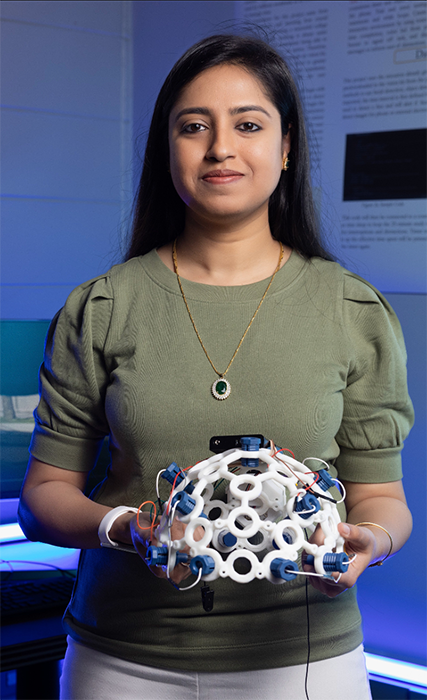While the buzz surrounding artificial intelligence (AI) is growing, Sylvia Bhattacharya
has been at the forefront of researching the technology for years.
 While the buzz surrounding artificial intelligence (AI) is growing, Sylvia Bhattacharya
has been at the forefront of researching the technology for years.
While the buzz surrounding artificial intelligence (AI) is growing, Sylvia Bhattacharya
has been at the forefront of researching the technology for years.
Bhattacharya is the director of the Neuro-Interaction Innovation Laboratory at Kennesaw
State University, where she and her students are working to improve AI models by studying
human intuitive decision-making in complex situations.
“There have been several discussions on whether AI will overtake roles held by humans,
but what we believe is that humans have their own expertise, and AI has its own strength,”
said Bhattacharya, an assistant professor of electrical engineering technology. “We
can improve several facets of life if we help them work together as a team."
Since 2020, Bhattacharya has received $1 million in grant funding from the U.S. Army
to study driver and passenger behaviors in combat zones. Her research team takes brain
signal processing, combined with signals from the muscles, skin, and eyes to create
different prediction algorithms that can help soldiers make decisions on the battlefield.
Her newest project funded by the U.S. Army focuses on understanding blind spots in
AI and how soldiers adapt in unfamiliar scenarios.
“We are trying to understand how the human brain adapts when presented with a new
environment,” Bhattacharya said. “If we can train that capability to AI algorithms,
they will achieve a different level of intelligence and be very useful on the battlefield.”
Ultimately, the technology aims to protect human soldiers by relying more on AI agents
in dangerous scenarios.
In addition to her groundbreaking research, Bhattacharya is passionate about encouraging
students from underrepresented populations to get involved in research. Since starting
at KSU in 2019, she has received two grants from Google to create a mentorship program
aimed at educating students on computing.
“We created a program called Computing to Change the World,” Bhattacharya said. “There
is a need to include more women and students from underrepresented populations in
computing, engineering, and research as a whole because the more we diversify our
teams, the more innovative ideas will stem from those diverse groups.”
Bhattacharya has been recognized by KSU for her exceptional contributions to research,
and she says more exciting projects are in the works. Her research team wants to build
an extended reality portion of the lab so they can collect their own simulation data
for the Army. They also hope other researchers on the Kennesaw and Marietta campuses
will be able to use the equipment for their own projects.
“I am immensely proud of the research my team and I have conducted so far, and I look
forward to seeing how our efforts will continue to shape the landscape of AI,” she
said.
“Sylvia is an outstanding researcher. In a short amount of time, she has secured external
funding, created meaningful connections, established a research lab, and recruited
and trained students ranging from undergraduates to Ph.D. researchers. She is committed
to advancing knowledge in the area of human-AI teaming and contributing to the academic
community through rigorous investigation and dissemination of findings,” said Dr.
Adeel Khalid, Interim Assistant Dean of Research and Professor.

